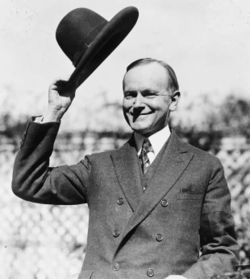
The man at the tiller during much of the Roaring ’20s was President Calvin Coolidge, even though he didn’t roar. “Silent Cal” died 74 years ago today at his home in Northampton, Mass., of coronary thrombosis at a relatively young 60. He had lived long enough, however, to see Herbert Hoover complete almost all of his term, the deepening of the Great Depression, and the landslide victory of FDR in the election of 1932.
Coolidge is receding from living memory at a fair clip now, toward the realm of obscure presidents. That’s too bad, because you have to like anyone about whom such entertaining anecdotes are told, though most of them are probably apocryphal. No point in repeating them here, since many web sites or articles or books dealing with President Coolidge are going to cite the usual-suspect bon mots of Dorothy Parker and all the rest (Wikipedia is as good a source for these as any, see "Slient Cal.")
History has a way of being revised and rethought, and so it is for Calvin Coolidge, at least for those few who pay him any mind. In a sympathetic and touching article originally published in Yankee magazine in 1996, presidential historian Richard Norton Smith posits that Coolidge struggled with deep depression after the death of his beloved second son, Calvin Jr., in 1924. He was able to mask it well, however, and so his suffering never entered the popular or even scholarly imagination about the president. (Besides, it’s more fun to quote Dorothy Parker.)
In another vein, columnist Robert Novak speculates that the nation and the world were worse for Coolidge’s decision not to run in 1928, an election he would have certainly won. Would he have done things differently than Hoover, even ameliorating the Depression with better decisions? Maybe. In any case, Coolidge offers a good deal more to think about than the taciturn New Englander stereotype that he’s been stuck with.
Two more things: songs that mention Coolidge. Who would have thought? Mentioned in passing, but he’s still in them. (There’s also the mention of “the Coolidge dollar” in “You’re the Top,” by Cole Porter, but that’s not exactly about the president.)
“Crazy Words, Crazy Tune," by Irving Aaronson and His Commanders, recorded when Coolidge was in office (Febraury 4, 1927).
“When Lindy Comes to Town,” by Al Stewart, released in 1995 on his Between the Wars album.
No comments:
Post a Comment